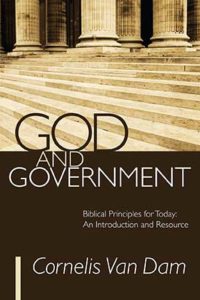Pluralism is the belief that people of different cultures and beliefs can live together in harmony. But when their different values inevitably clash how do these differences get resolved?
In this excerpt from Dr. Van Dam’s “God and Government” he outlines a specifically Christian form of pluralism that allows for believers and unbelievers to live in peace together, because it recognizes that God and his law are supreme.
*****
When God gathered his chosen people, his demands were clear. They had to be completely dedicated to his service. However, God recognized that within his kingdom of Israel, there was not only his holy nation, the church, but, as noted earlier, there were also others who did not really belong to the assembly of God’s people. They nevertheless lived within the kingdom of God on earth as established in Israel. To these people the Lord showed great forbearance. They were not forced to become worshippers of the God of Israel nor did God give any command to that effect to Israel’s rulers. However, they were expected to obey the prohibitive commands of God’s moral law. They could not, for example, indulge in sexual sin (Lev. 18:24–30), blaspheme God’s name (Lev 24:15) or sacrifice their children to the false god Molech. (Lev. 20:2). The people in whose midst they lived, as well as the land, was holy and they had to respect that. Indeed, God had expressly commanded that all the idolatrous nations living in Canaan had to be wiped out for the land was to be holy (Deut. 7; cf. Ps. 78:54; Zec. 2:12). There was, however, no such command for territories outside Canaan that were later conquered to be under Israel’s rule.
It is noteworthy that after David defeated Moab, the Aramaean kingdoms of Hadadezer (Damascus and Maacah), Edom, and the Ammonites, there is no hint anywhere in Scripture that he worked to remove all idolatry and false worship. Also no special attempt was made to compel these people to become worshippers of the true God. Since David’s office as a godly king over these gentile peoples roughly parallels the office of government today, this tolerance points to a principle that can apply to government today.
Tolerance of false religion
Indeed, state tolerance of false religion is not in disagreement with Scripture. God is long-suffering and patient. “He causes his sun to rise on the evil and the good, and sends rain on the righteous and the unrighteous” (Matt. 5:45). He allows the good grain as well as the weeds to grow together, until the time of harvest. Then God himself will separate the two in the final Day of Judgment (Matt. 13:36–43). Government can tolerate what the church cannot endure. Each has its own office and calling. In a modern pluralistic society, the following words of Christ are relevant: “do to others what you would have them do to you” (Matt. 7:12). If one asks freedom of worship for oneself, then it should also be granted to others.
As head of the church, Christ tolerates no ungodliness and sin. The church on earth must act accordingly. As head and ruler of his kingdom Christ is patient and bears with the weakness of the sinful human heart. His servants, the civil governments, must do likewise even as they are obligated to seek true righteousness and justice for the country entrusted to their rule.
State is not the Church
Besides the principle of toleration, there is the related principle of the civil authority being distinct from the religious authority in Israel. Even though church and state were very closely related, they were not identical. Each had its own jurisdiction. This has important implications. Even in Israel, which was a theocracy, there were clear limitations to what the king as civil ruler could do. Although the theocratic king had priestly and prophetic aspects to his office, he nevertheless remained in the first place the civil ruler in charge of the judicial and political affairs of the nation. Although the priests were vital in the theocracy, Israel as a theo

cracy was not a priest state as found in other ancient near Eastern countries such as Egypt. Priestly authority was limited to all things related to the administration of the sacrificial service of reconciliation, including instruction in the ways of the Lord. And so there were clear distinctions. Religious matters were in the province of the priests and the civil ones were the responsibility of the king. Accordingly, in the time of King Jehoshaphat the civil courts were organized specifically along the lines of religious and civil matters (2 Chron. 19:11; cf. 1 Chron. 26:30, 32).
We need to value the biblical principle that is involved here. Scripture gives no justification for a modern theocratic state such as we find in some Islamic jurisdictions. The Bible indicates that there is to be a clear separation of what we today call church and state, or spiritual authorit
y and civil authority. Christ’s teaching affirmed this when he said “My kingdom is not of this world. If it were, my servants would fight to prevent my arrest by the Jews. But now my kingdom is from another place” (John 18:36). Such thinking is completely contrary to, for example, the Muslim idea of a jihad or holy war that is necessary to establish their kingdom in the here and now.
All of this underlines the fact that the state is not given the duty to force people to love God and to worship him. The state is permitted to tolerate things that the church cannot tolerate. There is, however, more to this larger issue.
Rule of Law
Another important principle in considering the relation of church and state is the rule of law. The Davidic king was not to be autocratic and self-seeking, thinking himself to be more worthy than those around him. He was God’s representative in the theocracy, sitting on God’s throne (1 Chron. 29:23) and therefore a servant of God who needed to submit to God’s law. The Lord even stipulated that when the king assumed the throne of the kingdom then he “is to write for himself on a scroll a copy of this law, taken from that of the priests, who are Levites. It is to be with him, and he is to read it all the days of his life so that he may learn to revere the LORD his God and follow carefully all the words of this law and these decrees and not consider himself better than his brothers and turn from the law to the right or to the left” (Deut. 17:18–20). In this way God’s will would be done for his chosen nation in his kingdom. With all the plurality that may have existed in Israelite society, above it all was the law of God. It needed to be heeded for the well-being of the people.
Israel’s rulers were not the only ones who were accountable to God. Pagan ones were as well. For example, Daniel told King Nebuchadnezzar that God had put him in power (Dan. 2:37–38) and so God warned the monarch through Daniel that unless he acknowledged God’s supreme place and repented of his sins in ruling, he would be driven from the throne to live with the wild animals (Dan. 4:24–27). There was accountability that had to be acknowledged.
Today, rulers are to be servants of God in the first place and as such also have an obligation to heed the abiding principles of God’s Word for the good of society. Thus, when government makes decisions pertaining to morals and issues on which the Word of God gives clear direction, it should not set itself above the norms which God has revealed. It is the duty of government to restrain sin and evil (Prov. 14:33; Rom. 13:4). How does the calling of the church factor into this obligation of the government?
Church is not the State
Clearly the task of the church is to preach the gospel and administer the reconciliation that God offers to humankind. The church’s “job description” was given by the risen Christ prior to his ascension when he said: “All authority in heaven and on earth has been given to me. Therefore go and make disciples of all nations, baptizing them in the name of the Father and of the Son and of the Holy Spirit, and teaching them to obey everything I have commanded you. And surely I am with you always, to the very end of the age” (Matt. 28:18–20). The church is to proclaim the glad tidings of salvation and gather God’s people together. The state must give the church the freedom and opportunity to do its calling of spreading the gospel. That gospel includes the proclamation of Christ’s kingship, a message the state must hear from the church or its members so that it understands its servant role.
The church’s task with respect to the state is not to make official pronouncements about the political issues of the day and to get involved in crafting government policy. The church as an institution has neither the charge nor expertise to do so. It is also not the task of the church to try to rule over the government (the Roman Catholic ideal). The state has its own God-given responsibilities. However, the church does have the duty to train and equip its members so that they can function meaningfully in today’s secular society as citizens of Christ’s kingdom and so influence also politics. Scripture is certainly relevant for the affairs of the state, but it is not the calling of the church as a corporate body to interfere in the political process and attempt to apply the biblical principles to the government agenda. That is the responsibility of Christians in all walks of life, also those involved in politics.
All of this does not mean that the church should always remain silent. There can be unusual circumstances when the church needs to speak up by means of the pulpit or otherwise in order to protect its God-given mission to preach the gospel and condemn sin where sin needs to be condemned. There can also be occasions when the government invites input from interested parties on new legislation which is of great interest to the church. Churches should then participate and make a case for the application of biblical principles on the issues of the day.
In summary, the church’s duty is to preach and safeguard the gospel and seek the spiritual well-being of its members. The resources and gifts of the church should focus on these central concerns. With respect to its task over against the government, the church must also lead the way in instructing its members to be good citizens and to be obedient to those in authority over them. Furthermore, the church is called to pray for those who rule over them (1 Tim. 2:1–4). Such prayer includes the petition that the state may continue to protect the freedom and ministry of the church so that the gospel can continue to be proclaimed. When that proclamation is blessed, it will eventually have a salutary effect on society and government.
In our current age of secularization, it is easy for the people of God to grow weary in seeking the best for those who rule over them. But, one must realize that there are usually no quick fixes to the dilemmas of evil and sin in society and often incremental change is all that is possible. But the church need never become despondent. It has every reason to be encouraged for an important truth is that God is supreme ruler over everything already. In a broad sense his kingdom encompasses the entire universe. The battle against evil has been won (Col. 1:13–20; 2:15). One day God’s kingdom will arrive in full perfection when all will recognize him as Lord and Master.
This excerpt is reprinted here with permission. To get a copy of “God and Government” email [email protected] for information (the suggested donation is $10). Or you can get a Kindle version at Amazon.ca or Amazon.com.












